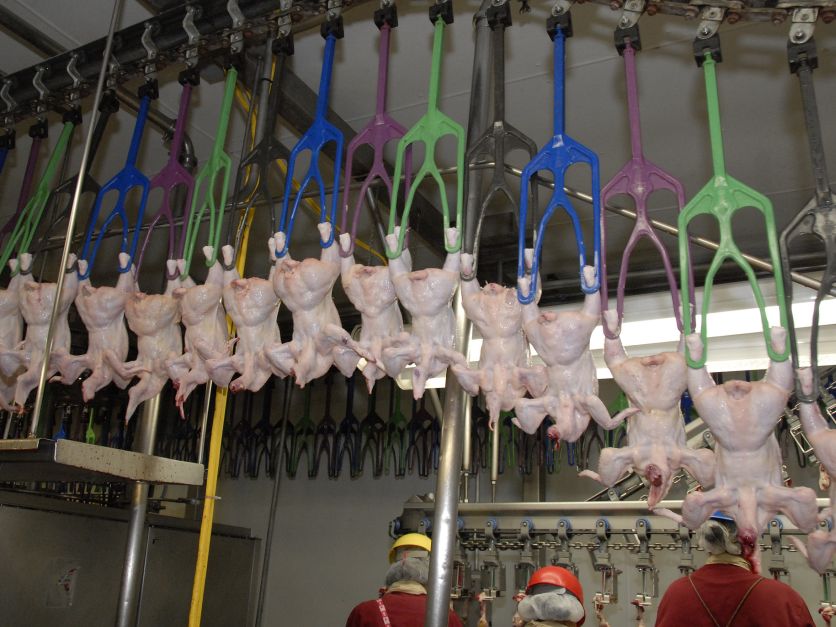The Agriculture Department on Friday laid out a potential new strategy for addressing salmonella contamination in poultry that includes requiring the testing of flocks and possibly declaring the bacteria an adulterant in all raw products intended for sale to consumers.
In an interview with Agri-Pulse, Sandra Eskin, USDA's deputy undersecretary for food safety, stressed that the strategy was essentially a “discussion draft,” not even a proposed rule, which is a formal set of proposed regulations.
“Because what we're thinking about is a significant pivot from where we have been in recent history, we felt it was important to share our thinking with stakeholders,” she said.
The strategy includes three primary components: Salmonella testing before flocks enter a processing plant, relocating some of the existing sampling procedures in plants, and possibly declaring certain levels or types of salmonella to be an adulterant in raw products. In August, USDA's Food Safety and Inspection Service declared salmonella to be an adulterant in breaded and stuffed raw chicken products.
Eskin says the steps are being considered to address a steady rate of salmonella infections among Americans. While contamination within raw poultry through USDA testing is going down, infections have been “stubbornly stuck for the last 20 years.”
FSIS cites Centers for Disease Control and Prevention figures showing an estimated 1.35 million infections occur each year in the U.S., and to meet 2030 federal goals, Salmonella infections — from all sources, not just poultry — must be reduced by 25%. FSIS says it plans to pursue a goal of reducing infections linked to the products it regulates — meat, poultry and eggs — by that same 25%.
While Friday’s announcement is meant to mark the beginning of a discussion, it’s also expected to begin a series of steps at USDA that will ultimately lead to rulemaking. Eskin said FSIS currently plans to formally propose new regulations in mid-2023 with the goal of finalizing main priorities by mid-2024.
So far, industry reaction has been measured, with the National Turkey Federation saying it “looks forward to continued dialogue with FSIS and working to identify effective, practical solutions to support public health.”
But the National Chicken Council's senior vice president of scientific and regulatory affairs, Ashley Peterson, said the process is “being done backwards.”
Interested in more coverage and insights? Receive a free month of Agri-Pulse!
“The agency is formulating regulatory policies and drawing conclusions before gathering data, much less analyzing it. This isn’t science — it’s speculation,” she said. “We continue to be disappointed that the agency has failed to use science and research to drive its regulatory policies.”
Eskin pushed back at that claim, arguing the proposal “is not something that we came up with out of thin air.”
“No, we're not doing this backwards,” she said. “Our initial thinking has been informed by experts inside and outside the agency. But there's a lot more data and science we need to consider as we move toward proposing specific policies and finalizing them.”
Consumer groups welcomed the development.
Sarah Sorscher, deputy director of regulatory affairs for the Center for Science in the Public Interest, called the consideration of salmonella as an adulterant “a landmark acknowledgment from an agency that has long refused to recognize that salmonella in raw poultry poses unacceptable risks.”
“While the proposed framework represents a welcome shift in thinking by the agency, many important details are yet to be worked out, and the need for these changes is urgent,” she added. “Under the agency’s proposal, rules implementing the framework would not be finalized until mid-2024, a long time to wait for the estimated one million Americans sickened each year by salmonella illness.”
A spokesperson for the Center for Food Safety noted the organization has been “pushing FSIS to declare the most dangerous serotypes of Salmonella as adulterants for some time. These steps will make chicken safer for consumers.”
Consumer Federation of America Director of Food Policy Thomas Gremillion urged USDA to set hard lines as it moves forward in its rulemaking.
“The details matter,” he said. “If USDA settles on salmonella product standards that do not challenge the industry to clean up its act, or that only apply to a narrow range of products, consumers will still get sick.”
USDA plans to convene a virtual public meeting on the proposal Nov. 3.
For more news, go to www.Agri-Pulse.com.


